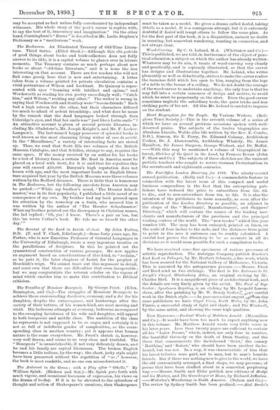The Bookworm. An Illustrated Treasury of Old-Time Litera- ture. Third
Series. (Elliot Stock.)—Although this olla podrida of good things about books and book-collectors does not fully answer to its title, it is a capital volume to glance over in leisure moments. The Treasury contains as much perhaps about new books as about " old-time literature," and it is none the less interesting on that account. There are few readers who will not find some gossip here that is new and entertaining. A letter taken from a volume printed for private circulation contains a vivid portraiture of Wilson and Lockhart. De Quincey is repre- sented with eyes " beaming with intellect and opium," and Wordsworth as reading his own poetry exceedingly well ; "Catch him," said Wilson," reciting any other." The writer is wrong in saying that Wordsworth and Southey were " bosom-friends." Each bad a high esteem for the other, but their characters differed too much to admit of ardent friendship ; and what does he mean by the remark that the dead languages looked through Sara Coleridge's eyes, and that her smile was " just like a Latin smile " ? An attractive account is given of several private libraries, in- cluding Mr. Gladstone's, Mr. Joseph Knight's, and Mr. F. Locker- Lampson's. The last-named happy possessor of splendid books is well known as the most charming living writer of vers de socide. In the " Miscellanea," a variety of interesting facts are stored up. Thus, we read that Scott fills two volumes of the British Museum Catalogue, and that Schiller, strange to say, requires the same space. If the money received by an author for his books be a test of literary fame, a certain Mr. Buel in America must be placed on a level with Scott, for it is said that his royalties this year will exceed £10,000. Bunyan's high reputation does not lessen with age, and the most important books in English litera- ture acquired last year by the British Museum were three volumes written by the Bedford dreamer. There is little that is humorous in The Bookworm, but the following anecdote from America may be quoted :—" While my brother's novel, The Hoosier School- master,' was in its first popularity, I published a little novel of no consequence of my own. My brother had my book pressed upon his attention by the news-boy on a train, who assured him it was written by the author of ' The Hoosier Schoolmaster.' When my brother pointed out the discrepancy in Christian names, the lad replied : Oh, yes ! I know. There's a pair on 'em, but this 'an wrote t'other's book. He tole me so hisself the other day,










































 Previous page
Previous page